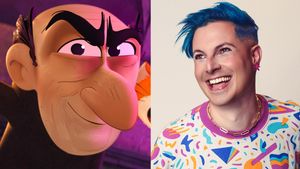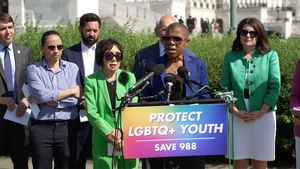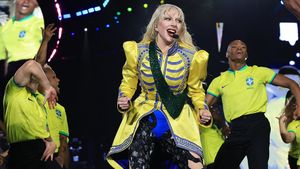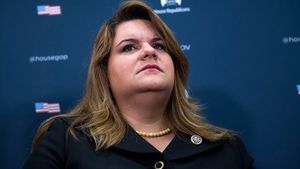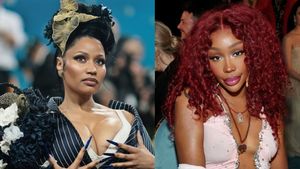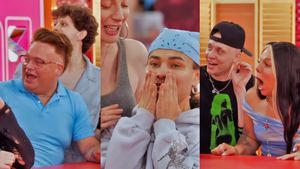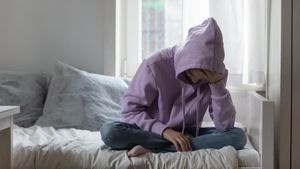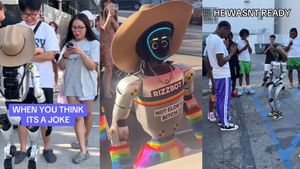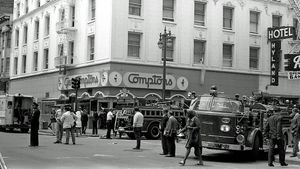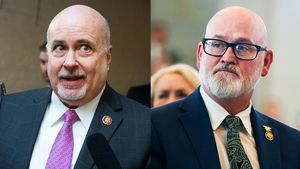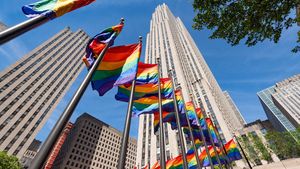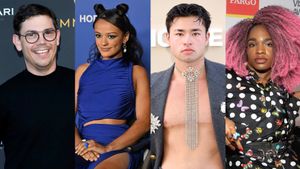
Treatment GuideJust DiagnosedSex & DatingAfrican AmericanStigmaAsk the HIV DocPrEP En EspañolNewsVoicesPrint IssueVideoOut 100
CONTACTCAREER OPPORTUNITIESADVERTISE WITH USPRIVACY POLICYPRIVACY PREFERENCESTERMS OF USELEGAL NOTICE
© 2025 Pride Publishing Inc.
All Rights reserved
All Rights reserved
Scroll To Top
By continuing to use our site, you agree to our Privacy Policy and Terms of Use.
Aimee Elizabeth Lang initially learned about AIDS in the second grade, when she first encountered the AIDS Memorial Quilt in Washington, D.C. Throughout her school years, she became particularly interested in learning about sexuality and health and, as a result, decided to work as a peer mentor at her Buffalo, N.Y., high school, providing fellow students with safer-sex and HIV/AIDS information. 'If our peers had questions about sex or didn't feel comfortable talking to the school nurse or their teachers about it, we were the people to come to,' she says. Lang's now the program associate and project coordinator for HIV/AIDS awareness at the Harlem, N.Y., offices of the National Coalition of 100 Black Women (NC100BW), a post she took upon graduating from New York University in 2009. As a child Lang was taught about HIV and AIDS, but it wasn't until her work as a peer educator that she began to understand how the disease disproportionately affects blacks. According to the Kaiser Family Foundation, African-Americans make up nearly half of the 1.1 million people in the country with HIV, while representing only 12% of the total U.S. population. 'I've always grown up with HIV awareness around me,' Lang says, adding, 'My mom brought it to my and my brother's attention. Eventually, I learned about how devastating [HIV is] for women of color and their families. HIV is the leading cause of death for 25-34-year-old black women, and a lot of it is because they don't have access to HIV/AIDS treatment or general awareness.' While Lang was learning, America's civil rights organizations were learning as well, grappling with long-held notions about AIDS. As these groups' attention has turned to the spread of HIV in the U.S., African-Americans are being recognized as a population needing specific education, outreach, and treatment. So naturally, one of the best avenues for those three things are civil rights groups that have been reaching out to and advocating for black people on a grassroots level for generations. Just recently the largest and oldest of these organizations, the National Association for the Advancement of Colored People, which represents black Americans with its many active chapters and prominent national assembly, began to tackle AIDS as a civil rights issue, though the work has not been without its obstacles. Shavon Arline, the director of health programs for the NAACP, has built her career around speaking frankly as a way to empower communities to face wide-reaching health issues. Before joining the national group in September 2009, she served a local Washington, D.C., chapter with health-related outreach to youth in the area. That experience, she says, prepared her to engage a national audience who were hung up on old notions about addressing HIV and sexuality. Overcoming squeamishness about sex is no small feat within the context of a civil rights movement whose members are so often closely linked to churches. 'We have to get to a point where we can talk about sexuality,' Arline says. 'It's one of the biggest taboos in the black community. So many people are raised in churches and taught that [HIV prevention equals] abstinence, and that's it. But you find young people in communities of faith who hear that and nothing else'then they go off and experiment and expose themselves to risky situations. We have to expand the conversation to say 'Abstinence is best, but experimenting safely is OK too.' ' Arline's move to the national NAACP offices coincided with a growing national dialogue on wellness: health care reform in Congress, the Centers for Disease Control and Prevention's Act Against AIDS Leadership Initiative, and the release of the Obama administration's National HIV/AIDS Strategy. At the time, the NAACP had gone nearly three years without anyone officially overseeing its health strategies on a national scale. Since she took on her role, HIV/AIDS has become one of the first disease-specific initiatives that the organization has addressed. Typically, the organization has pushed for access to fair and affordable health care, but it saw HIV and childhood obesity as two issues that were in dire need of direct action among African-Americans. The CDC sees the expansion of civil rights missions to include HIV/AIDS as a way to further the agency's initiatives as well as help these groups with their own projects. Robert Bailey, leader of the Prevention Partnerships Team within the CDC's HIV/AIDS prevention division, says the fight against HIV goes further than simply condom and pamphlet distribution. 'We need to turn the tide about this disease, so we'll have to get this and all of its causes,' he says. 'It's not only HIV, but we're also talking about other sexually transmitted diseases, lower income levels, education'all of which are major factors in HIV.' Lang also sees that socioeconomics play a role in the high rate of HIV among African-Americans. 'According to the census, a quarter of African-Americans live in poverty,' she says. 'We know that HIV is more prevalent in impoverished areas of the country. People who live in poverty tend to have unsafe sex or multiple partners, which certainly contributes to the high rates of STDs, specifically in women.' This is where many of these civil rights groups'which have worked on issues such as education parity, voting rights, and housing discrimination for decades'can play a multidimensional role. Launched in April 2009, the CDC's Act Against AIDS Leadership Initiative is a $16 million, six-year partnership between the government agency and several national organizations, such as the NAACP and Lang's NC100BW. Since the program's launch, at least 200,000 people have attended more than 1,400 outreach events, many set up in conjunction with these civil rights organizations, according to the CDC. Act Against AIDS also aims to increase outreach to Latinos and men who have sex with men. Along with blacks, these populations are the hardest-hit when it comes to HIV'a harsh reality, as one of the most basic barriers the black population must overcome with HIV is its stigma and its association with homosexuality. 'If you look at the HIV epidemic, you have many men who don't want to get involved because of the fear of being associated with gay men, or being gay,' Arline says. 'It makes no sense'the disease is killing everybody.' During her tenure, Arline says she's seen the focus on HIV among organizations like hers shift dramatically. She attributes this as a direct response to efforts by the CDC, the federal Office of Minority Health, and other groups to expand their outreach to include HIV education and prevention. 'Looking back at our accomplishments over the last year and a half, we've had the greatest amount of changes, simply because we were able to receive funding,' she says. Leaders from other groups have also realized the crisis status of HIV and are acting accordingly. The National Council of Negro Women's AIDS-related programs are small, community-based outreach initiatives in the United States as well as in parts of Africa such as Zimbabwe, Senegal, and Egypt. The local chapters of 100 Black Men of America focus on various health issues'usually depending on the greatest need of each chapter. In New York City, for example, members recently held a youth symposium on teens living with and dating with HIV. The Reverend Al Sharpton's National Action Network has launched a five-year campaign called 'I Choose Life,' which recruits clergy, celebrities, government officials, and local leaders to become ambassadors for HIV outreach. And members of the Congressional Black Caucus recently submitted resolutions and legislation addressing HIV. Rep. Maxine Waters of California got her 2009 Stop AIDS in Prison Act through the House, but it was never granted a vote in the Senate. HIV/AIDS is not entirely new to all civil rights groups. It has been a key issue for the NC100BW since 1989. But some of that group's more recent efforts have been to foster casual discussion about HIV. Its Beauty Shop Chats, Lang says, are laid-back talks about HIV in a familiar, comfortable atmosphere where women are already having a dialogue about topical issues. 'This way, it's not such a formal thing,' she says. 'Some people become intimidated if you have one-on-one chats, so this makes it easier for people to talk or just listen.' As so many projects like the Beauty Shop Chats demonstrate, having an open dialogue about sexuality and sexual health helps people learn about HIV and therefore helps them stay protected. Lang stresses that people of all ages do want to talk about HIV, but the opportunity may not always present itself. To remedy that, local chapters of the NC100BW sponsor events to educate elderly women on HIV as well as go to high schools to provide information about the virus'an important step, as African-Americans make up 61% of newly diagnosed young people ages 13-24. While the rates of infection, AIDS-related deaths, and under-education are alarming, the hope is that a new focus, appropriate funding, and a national strategy will alleviate the epidemic among blacks and the overall population.
From our Sponsors
Most Popular
Lexi Love comes out as HIV+ after Trump deletes federal resources
January 23 2025 11:23 AM
Grindr is reminding us why jockstraps are so sexy and iconic
May 02 2025 5:36 PM
BREAKING NEWS: Trump admin moves to end federal HIV prevention programs
March 18 2025 6:10 PM
Trump's orders prompt CDC to erase HIV resources
January 31 2025 5:29 PM
Celebrating Black History Month with our annual African American issue
February 01 2025 3:28 PM
Tyler TerMeer vows to continue to fight for health care for all
January 28 2025 3:00 PM
Discover the power of Wellness in your life
March 26 2025 12:41 PM
Plus: Featured Video
Latest Stories
Dancer. Healer. Survivor. DéShaun Armbrister is all of the above
July 02 2025 8:23 PM
Two right-wing Supreme Court justices signal they may uphold access to PrEP and more
April 21 2025 4:10 PM
Broadway's best raise over $1 million for LGBTQ+ and HIV causes
April 03 2025 7:15 PM
Plus nominated for 2025 GLAAD Media Award
January 22 2025 12:42 PM
'RuPaul's Drag Race' star Trinity K Bonet quietly comes out trans
December 15 2024 6:27 PM
AIDS Memorial Quilt displayed at White House for the first time
December 02 2024 1:21 PM
BREAKING: Supreme Court rules to save free access to preventive care, including PrEP
June 27 2025 10:32 AM
1985: the year the AIDS crisis finally broke through the silence
June 26 2025 11:24 AM
Trump admin guts $258 million in funding for HIV vaccine research
June 03 2025 3:47 PM
500,000 Children at Risk: PEPFAR Funding Crisis
April 08 2025 3:51 PM
The Talk Season 5 premieres this spring with HIV guidance for the newly diagnosed
March 26 2025 1:00 PM
Jess King is here to help you live your happiest, healthiest life yet
March 24 2025 4:35 PM
A camp for HIV-positive kids is for sale. Here's why its founder is celebrating
January 02 2025 12:21 PM
VIDEO: A man living with HIV discusses his journey to fatherhood
June 10 2025 4:58 PM
HRC holds 'die-in' to protest Trump health care cuts
April 28 2025 2:11 PM
Season 4 of The Switch on resilience & radical self-love returns this spring
March 26 2025 12:20 PM
Gerald Garth is keeping people of color happy and healthy through trying times
March 11 2025 3:38 PM
This long-term HIV survivor says testosterone therapy helped save his life.
December 16 2024 8:00 PM
Ricky Martin delivers showstopping performance for 2024 World AIDS Day
December 05 2024 12:08 PM































